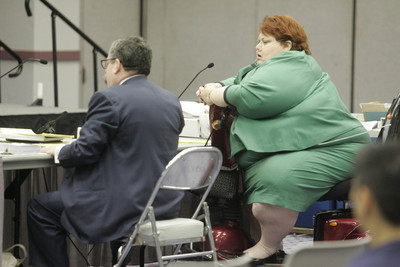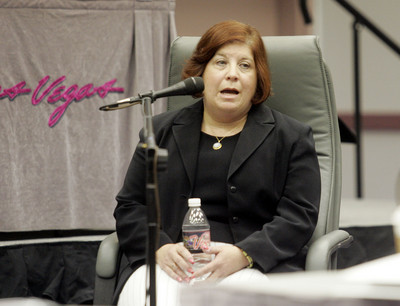Halverson: Bailiff too attentive
District Judge Elizabeth Halverson's former bailiff claims the suspended judge treated him like a personal servant, but Halverson says she's the victim.
During a disciplinary hearing Thursday in Las Vegas, Halverson testified that her former bailiff, Johnnie Jordan, was a devoted employee who didn't want to leave her side, voluntarily tried to massage her and happily put her slippers on her feet. She said it got to the point where she had to tell Jordan to stop being so dutiful.
"He tried to insist on putting them (slippers) on and off. We had fight after fight after fight about them because I told him repeatedly, 'I don't need you to put them on and off,'" she said.
In rambling testimony, Halverson painted herself as the victim of Jordan's fawning attention. She said Jordan would skip lunches because he didn't want her left unprotected and once tried to rub her feet but stopped when she told him it was inappropriate.
"It was a nightmare," she said.
Halverson's testimony was in stark contrast to Jordan's. On Monday, Jordan broke down crying when he told the seven members of the Nevada Judicial Discipline Commission that Halverson ordered him to do "demeaning" tasks. He accused Halverson of ordering him to pick the lint off her robes with Scotch tape, heat her food in a microwave stored in a bathroom and massage her neck and feet.
"I can't stand what she did to me!" Jordan said.
The Judicial Discipline Commission filed a 14-count complaint against Halverson accusing her of mistreating her staff, communicating improperly with jurors during trials and falling asleep on the bench. Halverson, 50, has denied the charges.
Halverson has been suspended from the bench since July 2007 but has continued to receive her $130,000 annual salary.
The commission this week has been holding a quasi-judicial disciplinary hearing centering on the allegations. At the end of the hearing, the commissioners will decide if there is enough evidence to prove Halverson committed misconduct.
The Judicial Discipline Commission, the only agency with the authority to sanction a sitting judge in Nevada, could have Halverson permanently removed from the bench.
Halverson is scheduled to continue testifying today.
Although the disciplinary hearing is centered on Halverson's behavior, her attorney, Michael Schwartz, shifted attention Thursday to Halverson's former judicial executive assistant, Ileen Spoor.
Spoor, who testified Thursday, was grilled by Schwartz for allegedly fixing traffic tickets while working for Halverson. The accusation stems from a file marked "quick fix" that Spoor kept in the office. The file had copies of dozens of traffic tickets from people who gave them to Spoor for help.
Spoor testified that she did nothing wrong. She said she merely gave the tickets to lawyers, who then handled them through the justice court or municipal court system.
She said it was common practice among judicial executive assistants of district judges to refer tickets to attorneys even though traffic citations aren't handled in District Court. They are handled in justice and municipal courts. She described referring tickets to attorneys as "standard operating procedure" at the District Court.
In May 2007, Spoor filed a defamation suit against Halverson after the judge accused her of fixing traffic tickets illegally.
Schwartz said the conflict between Spoor and Halverson escalated when Halverson discovered that Spoor was referring the tickets to lawyers. He questioned why Spoor, who still works as a judicial executive assistant in District Court, would refer traffic tickets to attorneys when it wasn't part of her job as Halverson's assistant.
Spoor said she did it on her own time during breaks.
In one instance, Spoor faxed the ticket information to an unknown party using letterhead from Halverson's office, according to case evidence.
Schwartz said Halverson essentially tried to blow the whistle on the ticket issue, which created a wedge between Spoor and Halverson.
Several District Court judicial executive assistants contacted Thursday had different views on what Spoor was doing. One, who declined to be identified, agreed with Spoor that it was common for District Court judicial executive assistants to refer traffic tickets to attorneys.
She said it was done as a courtesy and the assistant or judge never got any payment for doing it.
Two other judicial executive assistants, one from Family Court, said they'd never heard of the practice.
When the ticket issue surfaced last year, court officials reviewed Spoor's e-mail but found no evidence of illegal activity.
Michael Sommermeyer, spokesman for the District Court, said Thursday that judicial executive assistants are allowed to refer individuals to lawyers for legal advice. Spoor's activity would fall under this category, he said.
When asked why tickets would be sent to a district judge, he said the judges are elected officials who sometimes receive tickets from their constituents.
He said that the public is free to send traffic tickets to judges at District Court but that it's up to the judge and staff whether they want to refer it to an attorney.
He said the practice was similar to Ticket Busters, the local legal service that advertises that it takes care of tickets.
Contact reporter David Kihara at dkihara@reviewjournal.com or 702-380-1039.


















